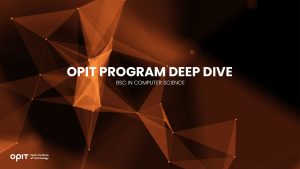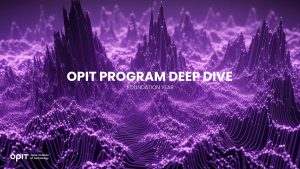

The future looks bright for the data science sector, with the U.S. Bureau of Labor Statistics stating that there were 113,300 jobs in the industry in 2021. Growth is also a major plus. The same resource estimates a 36% increase in data scientist roles between 2021 and 2031, which outpaces the national average considerably. Combine that with attractive salaries (Indeed says the average salary for a data scientist is $130,556) and you have an industry that’s ready and waiting for new talent.
That’s where you come in, as you’re exploring the possibilities in data science and need to find the appropriate educational tools to help you enter the field. A Master’s degree may be a good choice, leading to the obvious question – do you need a Master’s for data science?
The Value of a Masters in Data Science
There’s plenty of value to committing the time (and money) to earning your data science Master’s degree:
- In-depth knowledge and skills – A Master’s degree is a structured course that puts you in front of some of the leading minds in the field. You’ll develop very specific skills (most applying to the working world) and can access huge wellsprings of knowledge in the forms of your professors and their resources.
- Networking opportunities – Access to professors (and similar professionals) enables you to build connections with people who can give you a leg up when you enter the working world. You’ll also work with other students, with your peers offering as much potential for startup ideas and new roles as your professors.
- Increased job opportunities – With salaries in the $130,000 range, there’s clearly plenty of potential for a comfortable career pursuing a subject that you love. Having a Master’s degree in data science on your resume demonstrates that you’ve reached a certain skill threshold for employers, making them more likely to hire you.
Having said all of that, the answer to “do I need a Master’s for data science?” is “not necessarily.” There are actually some downsides to going down the formal studying route:
- The time commitment – Data science programs vary in length, though you can expect to commit at least 12 months of your life to your studies. Most courses require about two years of full-time study, which is a substantial time commitment given that you’ve already earned a degree and have job opportunities waiting.
- Your financial investment – A Master’s in data science can cost anywhere between about $10,000 for an online course to over $50,000 for courses from more prestigious institutions. For instance, Tufts University’s course requires a total investment of $54,304 if you wish to complete all of your credit hours.
- Opportunity cost – When opportunity beckons, committing two more years to your studies may lead to you missing out. Say a friend has a great idea for a startup, or you’re offered a role at a prestigious company after completing your undergraduate studies. Saying “no” to those opportunities may come back to bite you if they’re not waiting for you when you complete your Master’s degree.
Alternatives to a Masters in Data Science
If spending time and money on earning a Master’s degree isn’t to your liking, there are some alternative ways to develop data science skills.
Self-Learning and Online Resources
With the web offering a world of information at your fingertips, self-learning is a viable option (assuming you get something to show for it). Options include the following:
- Online courses and tutorials – The ability to learn at your own pace, rather than being tied into a multi-year degree, is the key benefit of online courses and tutorials. Some prestigious universities (including MIT and Harvard) even offer more bite-sized ways to get into data science. Reputation (both for the course and its providers) can be a problem, though, as some employers prefer candidates with more formal educations.
- Books and articles – The seemingly old-school method of book learning can take you far when it comes to learning about the ins and outs of data science. While published books help with theory, articles can keep you abreast of the latest developments in the field. Unfortunately, listing a bunch of books and articles that you’ve read on a resume isn’t the same as having a formal qualification.
- Data science competitions – Several organizations (such as Kaggle) offer data science competitions designed to test your skills. In addition to giving you the opportunity to wield your growing skillset, these competitions come with the dual benefits of prestige and prizes.
Bootcamps and Certificate Programs
Like the previously mentioned competitions, bootcamps offer intensive tests of your data science skills, with the added bonus of a job waiting for you at the end (in some cases). Think of them like cramming for an exam – you do a lot in a short time (often a few months) to get a reward at the end.
The prospect of landing a job after completing a bootcamp is great, but the study methods aren’t for everybody. If you thrive in a slower-paced environment, particularly one that allows you to expand your skillset gradually, an intensive bootcamp may be intimidating and counter to your educational needs.
Gaining Experience Through Internships and Entry-Level Positions
Any recent graduate who’s seen a job listing that asks for a degree and several years of experience can tell you how much employers value hands-on experience. That’s as true in data science as it is in any other field, which is where internships come in. An internship is an unpaid position (often with a prestigious company) that’s ideal for learning the workplace ropes and forming connections with people who can help you advance your career.
If an internship sounds right for you, consider these tips that may make them easier to find:
- Check the job posting platforms – The likes of Indeed and LinkedIn are great places to find companies (and the people within them) who may offer internships. There are also intern-dedicated websites, such as internships.com, which focus specifically on this type of employment.
- Meet the basic requirements – Most internships don’t require you to have formal qualifications, such as a Master’s degree, to apply. But by the same token, companies won’t accept you for a data science internship if you have no experience with computers. A solid understanding of major programming and scripting languages, such as Java, SQL, and C++, gives you a major head start. You’ve also got a better chance of landing a role if you enrolled in an undergraduate program (or have completed one) in computer science, math, or a similar field.
- Check individual business websites – Not all companies run to LinkedIn or job posting sites when they advertise vacant positions. Some put those roles on their own websites, meaning a little more in-depth searching can pay off. Create a list of companies that you believe you’d enjoy working for and check their business websites to see if they’re offering internships via their sites.
Factors to Consider When Deciding if a Masters Is Necessary
You know that the answer to “Do you need a Master’s for data science?” is “no,” but there are downsides to the alternatives. Being able to prove your skills on a resume is a must, which the self-learning route doesn’t always provide, and some alternatives may be too fast-paced for those who want to take their time getting to grips with the subject. When making your choice, the following four factors should play into your decision-making
Personal Goals and Career Aspirations
The opportunity cost factor often comes into play here, as you may find that some entry-level roles for computer science graduates can “teach you as you go” when it comes to data science. Still, you may not want to feel like you’re stuck in a lower role for several years when you could advance faster with a Master’s under your belt. So, consider charting your ideal career course, with the positions that best align with your goals, to figure out if you’ll need a Master’s to get you to where you want to go.
Current Level of Education and Experience
Some of the options for getting into data science aren’t available to those with limited experience. For example, anybody can make their start with books and articles, which have no barrier to entry. But many internships require demonstrable proof that you understand various programming and scripting languages, with some also asking to see evidence of formal education. As for a Master’s degree, you’ll need a BSc in computer science (or an equivalent degree) to walk down that path.
Financial Considerations
Money makes the educational wheel turn, at least when it comes to formal education. As mentioned, a Master’s in data science can set you back up to $50,000, which may sting (and even be unfeasible) if you already have student loans to pay off for an undergraduate degree. Online courses are more cost-effective (and offer certification), while bootcamps and competitions can either pay you for learning or set you up in a career if you succeed.
Time Commitment and Flexibility
The simple question here is how long do you want to wait to start your career in data science? The patient person can afford to spend a couple of years earning their Master’s degree, and will benefit from having formal and respectable proof of their skills when they’re done. But if you want to get started right now, internships combined with more flexible online courses may provide a faster route to your goal.
A Master’s Degree – Do You Need It to Master Data Science?
Everybody’s answer is different when they ask themselves “do I need a Master’s in data science?” Some prefer the formalized approach that a Master’s offers, along with the exposure to industry professionals that may set them up for strong careers in the future. Others are less patient, preferring to quickly develop skills in a bootcamp, while yet others want a more free-form educational experience that is malleable to their needs and time constraints.
In the end, your circumstances, career goals, and educational preferences are the main factors when deciding which route to take. A Master’s degree is never a bad thing to have on your resume, but it’s not essential for a career in data science. Explore your options and choose whatever works best for you.
Related posts

Computer Science is fast becoming one of the most valuable fields of study, with high levels of demand and high-salaried career opportunities for successful graduates. If you’re looking for a flexible and rewarding way to hone your computing skills as part of a supportive global community, the BSc in Computer Science at the Open Institute of Technology (OPIT) could be the perfect next step.
Introducing the OPIT BSc in Computer Science
The OPIT BSc in Computer Science is a bachelor’s degree program that provides students with a comprehensive level of both theoretical and practical knowledge of all core areas of computer science. That includes the likes of programming, databases, cloud computing, software development, and artificial intelligence.
Like other programs at OPIT, the Computer Science BSc is delivered exclusively online, with a mixture of recorded and live content for students to engage with. Participants will enjoy the instruction of world-leading lecturers and professors from various fields, including software engineers at major tech brands and esteemed researchers, and will have many paths open to them upon graduation.
Graduates may, for example, seek to push on with their educational journeys, progressing on to a specialized master’s degree at OPIT, like the MSc in Digital Business and Innovation or the MSc in Responsible Artificial Intelligence. Or they could enter the working world in roles like software engineer, data scientist, web developer, app developer, or cybersecurity consultant.
The bullets below outline the key characteristics of this particular course:
- Duration: Three years in total, spread across six terms.
- Content: Core courses for the first four terms, a student-selected specialization for the fifth term, and a capstone project in the final term.
- Focus: Developing detailed theoretical knowledge and practical skills across all core areas of modern computer science.
- Format: Entirely online, with a mixture of live lessons and asynchronous content you can access 24/7 to learn at your own pace.
- Assessment: Progressive assessments over the course of the program, along with a capstone project and dissertation, but no final exams.
What You’ll Learn
Students enrolled in the BSc in Computer Science course at OPIT will enjoy comprehensive instruction in the increasingly diverse sectors that fall under the umbrella of computer science today. That includes a close look at emerging technologies, like AI and machine learning, as well as introductions to the fundamental skills involved in designing and developing pieces of software.
The first four terms are the same for all students. These will include introductions to software engineering, computer security, and cloud computing infrastructure, as well as courses focusing on the core skills that computer scientists invariably need in their careers, like project management, quality assurance, and technical English.
For the fifth term, students will have a choice. They can select five electives from a pool of 27, or select one field to specialize in from a group of five. You may choose to specialize in all things cybersecurity, for example, and learn about emerging cyber threats. Or you could focus more on specific elements of computer science that appeal to your interests and passions, such as game development.
Who It’s For
The BSc in Computer Science program can suit a whole range of prospective applicants and should appeal to anyone with an interest or passion for computing and a desire to pursue a professional career in this field. Whether you’re seeking to enter the world of software development, user experience design, data science, or another related sector, this is the course to consider.
In addition, thanks to OPIT’s engaging, flexible, and exclusively online teaching and learning systems, this course can appeal to people from all over the globe, of different ages, and from different walks of life. It’s equally suitable for recent high school graduates with dreams of making their own apps to seasoned professionals looking to broaden their knowledge or transition to a different career.
The Value of the BSc in Computer Science Course at OPIT
Plenty of universities and higher education establishments around the world offer degrees in computer science, but OPIT’s program stands out for several distinctive reasons.
Firstly, as previously touched upon, all OPIT courses are delivered online. Students have a schedule of live lessons to attend, but can also access recorded content and digital learning resources as and when they choose. This offers an unparalleled level of freedom and flexibility compared to more conventional educational institutions, putting students in the driving seat and letting them learn at their own pace.
OPIT also aims not merely to impart knowledge through lectures and teaching, but to actually help students gain the practical skills they need to take the next logical steps in their education or career. In other words, studying at OPIT isn’t simply about memorizing facts and paragraphs of text; it’s about learning how to apply the knowledge you gain in real-world settings.
OPIT students also enjoy the unique benefits of a global community of like-minded students and world-leading professors. Here, distance is no barrier, and while students and teachers may come from completely different corners of the globe, all are made to feel welcome and heard. Students can reach out to their lecturers when they feel the need for guidance, answers, and advice.
Other benefits of studying with OPIT include:
- Networking opportunities and events, like career fairs, where you can meet and speak with representatives from some of the world’s biggest tech brands
- Consistent support systems from start to finish of your educational journey in the form of mentorships and more
- Helpful tools to expedite your education, like the OPIT AI Copilot, which provides personalized study support
Entry Requirements and Fees
To enroll in the OPIT BSc in Computer Science and take your next steps towards a thrilling and fulfilling career in this field, you’ll need to meet some simple criteria. Unlike other educational institutions, which can impose strict and seemingly unattainable requirements on their applicants, OPIT aims to make tech education more accessible. As a result, aspiring students will require:
- A higher secondary school leaving certificate at EQF Level 4, or equivalent
- B2-level English proficiency, or higher
Naturally, applicants should also have a passion for computer science and a willingness to study, learn, and make the most of the resources, community, and support systems provided by the institute.
In addition, if you happen to have relevant work experience or educational achievements, you may be able to use these to skip certain modules or even entire terms and obtain your degree sooner. OPIT offers a comprehensive credit transfer program, which you can learn more about during the application process.
Regarding fees, OPIT also stands out from the crowd compared to conventional educational institutions, offering affordable rates to make higher tech education more accessible. There are early bird discounts, scholarship opportunities, and even the option to pay either on a term-by-term basis or a one-off up-front fee.

The Open Institute of Technology (OPIT) provides a curated collection of courses for students at every stage of their learning journey, including those who are just starting. For aspiring tech leaders and those who don’t quite feel ready to dive directly into a bachelor’s degree, there’s the OPIT Foundation Program. It’s the perfect starting point to gain core skills, boost confidence, and build a solid base for success.
Introducing the OPIT Foundation Year Program
As the name implies, OPIT’s Foundation Program is about foundation-level knowledge and skills. It’s the only pre-bachelor program in the OPIT lineup, and successful students on this 60-ECTS credit course will obtain a Pre-Tertiary Certificate in Information Technology upon its completion. From there, they can move on to higher levels of learning, like a Bachelor’s in Digital Business or Modern Computer Science.
In other words, the Foundation Program provides a gentle welcome into the world of higher technological education, while also serving as a springboard to help students achieve their long-term goals. By mixing both guided learning and independent study, it also prepares students for the EQF Level 4 experiences and challenges they’ll face once they enroll in a bachelor’s program in IT or a related field.
Here’s a quick breakdown of what the OPIT Foundation Program course involves:
- Duration: Six months, split into two terms, with each term lasting 13 weeks
- Content: Three courses per term, with each one worth 10 ECTS credits, for a total of 60
- Focus: Core skills, like mathematics, English, and introductory-level computing
- Format: Video lectures, independent learning, live sessions, and digital resources (e-books, etc.)
- Assessment: Two to three assessments over the course of the program
What You’ll Learn
The OPIT Foundation Program doesn’t intensely focus on any one particular topic, nor does it thrust onto you the more advanced, complicated aspects of technological education you would find in a bachelor’s or master’s program. Instead, it largely keeps things simple, focusing on the basic building blocks of knowledge and core skills so that students feel comfortable taking the next steps in their studies.
It includes the following courses, spread out across two terms:
- Academic Skills
- Mathematics Literacy I
- Mathematics Literacy II
- Internet and Digital Technology
- Academic Reading, Writing, and Communication
- Introduction to Computer Hardware and Software
Encompassing foundational-level lessons in digital business, computer science, and computer literacy, the Foundation Program produces graduates with a commanding knowledge of common operating systems. Exploring reading and writing, it also helps students master the art of communicating their ideas and responses in clear, academic English.
Who It’s For
The Foundation Year program is for people who are eager to enter the world of technology and eventually pursue a bachelor’s or higher level of education in this field, but feel they need more preparation. It’s for the people who want to work on their core skills and knowledge before progressing to more advanced topics, so that they don’t feel lost or left behind later on.
It can appeal to anyone with a high school-level education and ambitions of pushing themselves further, and to anyone who wants to work in fields like computer science, digital business, and artificial intelligence (AI). You don’t need extensive experience or qualifications to get started (more on that below); just a passion for tech and the motivation to learn.
The Value of the Foundation Program
With technology playing an increasingly integral role in the world today, millions of students want to develop their tech knowledge and skills. The problem is that technology-oriented degree courses can sometimes feel a little too complex or even inaccessible, especially for those who may not have had the most conventional educational journeys in the past.
While so many colleges and universities around the world simply expect students to show up with the relevant skills and knowledge to dive right into degree programs, OPIT understands that some students need a helping hand. That’s where the Foundation Program comes in – it’s the kind of course you won’t find at a typical university, aimed at bridging the gap between high school and higher education.
By progressing through the Foundation Program, students gain not just knowledge, but confidence. The entire course is aimed at eliminating uncertainty and unease. It imbues students with the skills and understanding they need to push onward, to believe in themselves, and to get more value from wherever their education takes them next.
On its own, this course won’t necessarily provide the qualifications you need to move straight into the job market, but it’s a vital stepping stone towards a degree. It also provides numerous other advantages that are unique to the OPIT community:
- Online Learning: Enjoy the benefits of being able to learn at your own pace, from the comfort of home, without the costs and inconveniences associated with relocation, commuting, and so on.
- Strong Support System: OPIT professors regularly check in with students and are on hand around the clock to answer queries and provide guidance.
- Academic Leaders: The OPIT faculty is made up of some of the world’s sharpest minds, including tech company heads, experienced researchers, and even former education ministers.
Entry Requirements and Fees
Unlike OPIT’s other, more advanced courses, the Foundation Program is aimed at beginners, so it does not have particularly strict or complex entry requirements. It’s designed to be as accessible as possible, so that almost anyone can acquire the skills they need to pursue education and a career in technology. The main thing you’ll need is a desire to learn and improve your skills, but applicants should also possess:
- English proficiency at level B2 or higher
- A Secondary School Leaving Certificate, or equivalent
Regarding the fees, OPIT strives to lower the financial barrier of education that can be such a deterrent in conventional education around the world. The institute’s tuition fees are fairly and competitively priced, all-inclusive (without any hidden charges to worry about), and accessible for those working with different budgets.
Given that all resources and instruction are provided online, you can also save a lot of money on relocation and living costs when you study with OPIT. In addition, applicants have the option to pay either up front, with a 10% discount on the total, or on a per-term basis, allowing you to stretch the cost out over a longer period to ease the financial burden.
Have questions?
Visit our FAQ page or get in touch with us!
Write us at +39 335 576 0263
Get in touch at hello@opit.com
Talk to one of our Study Advisors
We are international
We can speak in:


